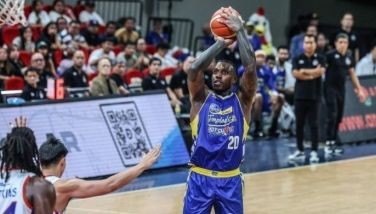Reflect, review, recall, renew, recreate, restart
On the threshold of another Southeast Asian Games, the powers behind the Philippine Olympic Committee and Philippine Sports Commission are one in pronouncements that things will now be different, that all the necessary steps will finally be taken to ensure the best possible preparation for the biennial meet. Failure has apparently fallen off the list of options for Team Philippines, as far as our sports authorities are concerned.
All that is well and good, and the recent sports summit should help create a blueprint for the country’s sports program. But one year is still not enough for all the new initiatives to fully take hold, unless we are able to send our athletes to China to train, as we did prior to the 2005 SEA Games held here. One solution is really to isolate the athletes from politics, family and other distractions in the months leading up to major competitions.
Also, it is time that the PSC and POC individually and jointly follow processes used by many multinational organizations and consulting firms in creating enduring programs. It will entail a lot of thinking and planning, investing in a clear, detailed, specific plan, not just rough edges and broad strokes. In other words, it has to be thought through and followed to the letter. The athletes are willing to follow, but who is able to teach?
In all seriousness, the PSC needs about P800 million just this year to fund all the national sports association programs. As of now, it has only half that. The agency has not divulged the necessary procurement of equipment and foreign exposure, which in years past has been woefully inadequate. But if the funds do not come, what can be done? The PSC has to take a long, hard, impersonal look at what needs to be done, and fast.
Reflection is the biggest first step, and it will set the direction for whatever all our sports authorities do next. What kind of sports program do we want? Do we want to specialize in certain sports, like Cuba and Korea? Or do we want to turn our attention to sports that are largely ignored by promise of huge medal tallies? That was China’s strategy for hosting the Olympic Games. They attacked their weakness in medal-rich sports, and turned them into strengths. It is that kind of dedication that we will need to develop. Again, it is not a personal decision. For example, as I mentioned before, if you only had 12 slots for a SEA Games, which athletes would you send? At one end, you could satisfy our illogical love for basketball and send a full team that would surely win the one gold medal for the men. But you could also send a complement of boxers, swimmers or track athletes, instead, boosting your potential for medal rewards. It is a choice that must be made first. On top of that, do we merely want to concentrate on Olympic sports, or shall we decide to include sports that are not on the Olympic calendar? It’s a tough decision.
Review is the next step. We can’t undo what has already been done, but we can do some thing differently. Which competitions are we looking at to boost our chances at a sport’s world championship status or Olympic qualification? What have we been doing in the past that has worked, and what hasn’t? This is not an issue of popularity or affinity. It is imply an issue of results. If, for example, our team’s scores and times are nowhere near the current opposition we will face, do we really want to field also-rans? Wouldn’t that be an unconscionable abuse of funds? Honestly, we might not like sports like shooting, athletics or even swimming as much as basketball, billiards or boxing, but they can bring in more medals. It is what it is, a simple statement of fact.
Given what we find in the first two steps, we then recall programs that don’t work. If, for example, we find that certain sports are in decline or are not giving us the results we want or even results that have been promised, why continue? In any professional setting, the bottomline is the bottomline. It is an agreement between client and supplier, for example. The client is the PSC as an extension of the president, as an extension of the Filipino people. Therefore, if they receive government funding, each NSA is answerable to Juan dela Cruz.
President Noynoy Aquino himself used that slogan in the vernacular in his campaign, “You are our boss.” So if we are the boss, we have a say.
Renewal of working programs must be immediately pursued to ensure continuity. For example, if we established certain parameters in the first few steps of the process, we will realize that boxing, soccer, rugby, billiards, women’s basketball, dragonboat, lawn bowls and a few other sports have been among the more successful sports in 2010. Some have even succeeded with very minimal support. What more if they were buoyed up by the full backing of the PSC? Then we give then what they need. Rugby, for example, has climbed up from the lowest level in Asia to the highest in the last four years. It has finally sent women’s teams to represent the country abroad. Lawn bowls has sent one or two athletes to world events, and has brought home medals. Can we now proportionately increase support for these sports? Wouldn’t that make sense?
Many thanks to all my friends who remembered my birthday last Friday. It was genuinely uplifting to hear from all of you.
- Latest
- Trending
































